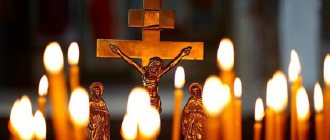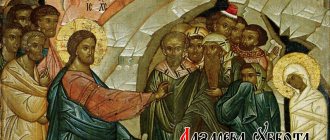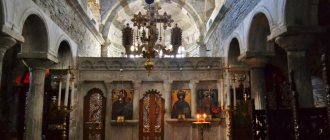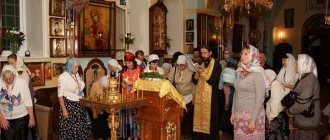Saturday, February 22, is not quite ordinary, since on this day Christians commemorate all deceased relatives with prayers, visit the temple and light candles for their repose. An Ecumenical memorial service is celebrated in the church on this day.
History and meaning of the holiday
Mentions of the Christian tradition of gathering in a large community at a cemetery to remember deceased relatives are found in various written sources in the 5th-6th centuries after the Nativity of Christ, so it is this period that can be called the birth of a tradition that has grown into a holiday.
Parents' Saturday is called because on this day it is customary to remember by name all deceased relatives. There are 7 such Saturdays in the church calendar. Only two of them are ecumenical, and this word means that in churches on such Saturdays a service is held for all the departed Christians on earth. Finally, it is called meat eating because the Sunday following it is the last day before Lent when you can eat meat.
There are several parental Saturdays in the year: Saturdays before Meat Week and before the Feast of the Trinity (Pentecost) - they are called Ecumenical Parental Saturdays.
Dedicating the Meat Week to the remembrance of the last Last Judgment of Christ, the Church, in view of this judgment, established to intercede not only for living members, but also for all who have died from time immemorial, who have lived in piety, of all generations, ranks and conditions, especially for those who died a sudden death.
The solemn all-church commemoration of the departed on this Saturday (as well as on Trinity Saturday) brings great benefit and help to our deceased fathers and brothers and at the same time serves as an expression of the fullness of the church life that we live.
Parents' Saturdays in 2022 fall on the following dates:
- Ecumenical Parents' Saturday (Meat and Meat Saturday) - February 22, 2020.
- Saturday of the 2nd week of Lent - March 14, 2022.
- Saturday of the 3rd week of Lent - March 21, 2022.
- Saturday of the 4th week of Lent - March 28, 2022.
- Commemoration of deceased soldiers - May 9, 2022.
- Radonitsa - April 28, 2022.
- Trinity Parents' Saturday in 2022 - June 6, 2020.
- Dimitrievskaya Parents' Saturday - October 31, 2022.
Parents' Saturdays in 2022 fall on the following dates:
- Ecumenical Parents' Saturday (Meat and Meat Saturday) - March 8, 2021.
- Saturday of the 2nd week of Great Lent - March 27, 2022.
- Saturday of the 3rd week of Lent - April 3, 2022.
- Saturday of the 4th week of Lent - April 10, 2022.
- Commemoration of deceased soldiers - May 9, 2022.
- Radonitsa - May 11, 2022.
- Trinity Parents' Saturday in 2022 - June 19, 2021.
- Dimitrievskaya Parents' Saturday - November 6, 2022.
How to behave in the temple
During the universal meat-free Saturday, which will take place on February 22, 2022, parishioners visit the temple and commemorate their deceased relatives. Below you can find a list of what you are allowed to do in the temple:
- you are allowed to write a note with the names of deceased relatives and light a candle for their repose;
- you can listen to chants and pray;
- it is necessary to give alms to those who need it and bring food, as well as Cahors;
- If you wish, you can order a memorial service.
Preparing for Easter
It is important to properly prepare for the celebration of the most important Orthodox holiday - Easter. The period of preparation for fasting consists of three weeks, each of which is devoted to a specific topic. It begins with the story of a Pharisee and a publican praying in the temple. Cheese Week is the final part of the preparatory period before Easter.
Weeks during preparation and Lent are devoted to specific topics:
- About the Pharisee and the Publican;
- About the Prodigal Son;
- Meat;
- Cheese waste.
This period is aimed at making it easier for a person to switch to an ascetic lifestyle from his usual way of life. Such preparation for Lent has been practiced for more than 16 centuries.
Is it possible to leave food at the grave and remember the deceased with vodka?
In the Orthodox world there are special days on which it is customary to remember and pray for the deceased - parental Saturdays. The first parental Saturday in 2022 falls on February 22 - Ecumenical or Meat Saturday. We tell you how to properly remember the dead, whether it is necessary to go to the cemetery, and also what you absolutely cannot do on this day.
What is Parents' Saturday?
Parental Saturdays in Christianity are days on which it is customary to remember the dead. These days you need to pray for your departed relatives and friends and visit them in cemeteries.
The history of the emergence of Ecumenical Parental Saturday
Ecumenical (meat-free) parental Saturday was established in the 5th century, in apostolic times. The Jerusalem Charter, which was compiled by Savva the Sanctified, speaks of the ancient tradition and custom of ancient Christians to flock to the cemetery on certain days to remember the dead. Written evidence of this has come to us from the 4th century.
Saturday was not chosen by chance as the day of remembrance. The Sunday after Ecumenical (meat-free) parental Saturday is dedicated to memories and prayers about the Last Judgment of Christ. Therefore, on Saturday (the day that precedes the judgment of Christ) they pray not only for the living members of their family, but also for everyone who has died from time immemorial, as well as for those who died a sudden death and were left without legal burial. Those praying ask the Lord for their mercy. Thus, the Church gives a chance for the salvation of the soul of every deceased.
Why does meat-eating parental Saturday have such a name?
Ecumenical or meat-free parental Saturday falls on February 22, 2022. The date changes every year, but traditionally it occurs a week before Lent.
The name “parental” most likely comes from the tradition of calling the deceased “parents,” that is, those who went to their fathers. Another version is that Saturdays began to be called “parental” Saturdays, because Christians prayerfully commemorated, first of all, their deceased parents.
It is called Meat Eating Week because it falls on Meat Eating Week (the week before Maslenitsa). It is also called Little Maslenitsa. And the name “ecumenical” comes from church tradition: on this day special services are held - ecumenical memorial services.
How is Ecumenical Parents' Saturday different from the rest?
Because it is customary to remember all baptized Christians. There are only two such Saturdays a year: Meat and Trinity. On these two days, ecumenical funeral services are held in the church. This is a special funeral service at which believers pray for the reassurance of the dead and ask God for forgiveness of sins and mercy for them.
How to remember the dead on Parents' Saturday?
On Parents' Saturday, it is customary to visit church and pray for deceased relatives. You can order a magpie or a liturgy.
But if you can’t visit the temple, you can submit a note of repose with the names of loved ones who died on Friday, the eve of parental Saturday. You can also pray at home near the icon (there are prayers for the departed in every prayer book). You can also remember the deceased by reading the Psalter, or read the canon of repose.
What can you do on this day?
You need to start and end parental Saturday with prayer. It is also customary to bake pancakes to commemorate the deceased. Some of them are distributed or taken to church. According to tradition, the first pancake is placed separately for the deceased.
On the eve of Parents' Saturday, houses are necessarily cleaned, and on Memorial Day itself, a memorial dinner is held, at which deceased loved ones and relatives are remembered. Before sitting down to the table, you also need to pray.
To the service on Parents' Saturday, believers bring notes with the names of those who need to be mentioned during general prayer. After visiting the temple, many go to cemeteries to put the graves in order, as well as once again remember those who are dear to their hearts.
Also on this day, it is customary to give alms with a request to pray for the deceased.
Is it necessary to go to the cemetery on Parents' Saturday?
Visiting the cemetery on Parents' Saturday is welcome, but not required. The main thing is not to do this instead of serving in the temple. It is more important on this day to attend a service and pray for deceased relatives. If possible, you can combine a trip to the temple and a trip to the cemetery.
At the cemetery you need to light a candle and pray. Then you should clean up the grave or simply remain silent and remember the deceased. You are not allowed to eat or drink in the cemetery. You cannot leave a memorial on the grave of the deceased that indicates his bad habits during life (for example, leaving cigarettes if he smoked). The ban also applies to food and alcohol (leaving or pouring vodka into a grave mound) - this is considered a relic of paganism.
You can leave sweets or cookies, but not on the grave, but on a bench near it, so that a person can remember the deceased.
In the cemetery you cannot talk loudly, quarrel or use foul language.
What should you not do on this day?
On Parents' Saturday you cannot quarrel, swear or speak badly about the deceased. It is also strictly forbidden to remember the deceased with vodka. Alms cannot be refused on this day, and noisy fun is not welcomed.
One should not leave objects from life on graves that indicate bad habits and addictions during life.
It is not prohibited to work on this day, but this should not interfere with going to church.
Folk signs for Parents' Saturday
There are many superstitions associated with memorial days. They did not appear today, but were formed over centuries. It’s another thing to believe prejudices or turn a blind eye to them. In any case, it is better to know about them.
- A number of signs and superstitions regarding parental Saturday are associated with feasts. On this day, it is forbidden to empty the table and wash the dishes at the end of the evening meal. It is believed that at night, deceased relatives will come to the house to share food with you.
- Often on this day, housewives baked pancakes, the first of which was offered to the deceased. If during the cooking process the first pancake fell to the floor, you had to say a prayer before returning it to the saucer. If you disobey the recommendations, you can bring death to the family.
- You shouldn’t get married on this day, otherwise you could invite trouble into your family life.
- In addition to the direct memory of relatives, this day was also important, because it was used to determine the weather for the next spring. If the weather was clear on February 22, the whole spring will also bring many fine days. If there was thunder, you had to listen to which direction the sound was coming from. The rumble on the northern side foreshadowed a cold spring, and on the eastern side a warm and dry next three months.
Is Maslenitsa a Christian holiday?
Maslenitsa is not based on Christianity at all. Every educated person knows this. Maslenitsa is an ancient pagan celebration of welcoming spring and seeing off winter. Previously, this holiday was a kind of bacchanalia, which was accompanied by games, fights, unbridled fun and abundant drunken feasts. Before the adoption of Christianity, such festivities were aimed at appeasing the pagan gods. In some cases, they were accompanied by human sacrifices, including the first martyrs - the Kiev Varangian Theodore and his son John. Therefore, the Orthodox Church, talking about the Last Judgment, calls for repentance and asks us to be wary of pagan rituals that still live in our subconscious.
How to properly spend Ecumenical Parents' Saturday
On February 22, 2022, the first Ecumenical Parental Saturday of the year began in Russia, namely “Ecumenical Meat-Free Parental Saturday.” And if the phrase “parents’ Saturday” is familiar to everyone - this is the time when the Church remembers the dead, and the word “ecumenical”, as is known, suggests that on this parent’s day they remember not only their deceased loved ones, then the epithet “meat-eater” needs explanation. More on this a little later, but now about the fact that on Ecumenical Parental Meat Saturday in Orthodox churches they honor the memory of all the deceased and especially those who did not receive a church funeral service or church prayer. That is, “abducted by sudden death” in a foreign land, missing, died from pestilence and hunger, in fires, from cold.
Now let’s figure out what the unusual-sounding name “Universal Meat-Eating Parental Saturday” means. In the Church, the dead are remembered every Saturday - after all, Sunday is ahead, a day that reminds us of the Resurrection of Christ and that from now on death has been defeated (that’s why we often use the word “departed” rather than “dead”).
Among these Saturdays there are those when during the service we remember our deceased loved ones in a special way - these Saturdays are called “parental” Saturdays. There are six such Saturdays: The Church recognizes the importance of our prayers for those who can no longer pray on their own and reminds believers of our duty to our departed relatives and friends. Let us note that the Church does not limit the prayerful remembrance of those who are already on the other side of breath to these six parental Saturdays - they pray for them on February 9 (for those who suffered for the faith of Christ), and on the Presentation of the Lord, which coincided with the day of the withdrawal of our troops from Afghanistan (15 February) - for the soldiers who died fulfilling their international duty, both on Radonitsa (April 28) and on May 9.
And twice a year during divine services we prayerfully commemorate not only those deceased whose memory is still alive in the human race, not only our ancestors, relatives and loved ones, but also all “Orthodox Christians who have departed from time immemorial, both those who were worthy of Christian death, and and those who were not guided into the afterlife by the prayers of the Church.” These two parental Saturdays are called “universal”.
Popular questions and answers
What else connects the traditions of Maslenitsa and the Meat Saturday that precedes it?
In a number of villages, children ran through the streets and collected torn old bast shoes. It was customary to throw these bast shoes at careless workers and unsuccessful traders who entered the village with empty carts. At the same time, this was done in a rather humorous manner.
What is the name of the week before Meat Saturday?
The week is called Motley. During these days, fasting alternated with meat days. Smooth preparations were underway for the beginning of Lent. Hence the name of the week, which in some regions was also called Ryaba.
Now about the word “meatless” in the name of Saturday, February 22, 2022.
The Church Slavonic word “meat is empty” is equivalent to the Greek verb translated as “I leave the meat,” “I let go of the meat,” that is, I eat it for the last time. And since the next day, Sunday, February 23, is the last day when believers allow themselves to “eat meat”, the day when we “leave meat”, that is, “meat-eating”, the Saturday before is also called “meat-eating” - in order to distinguish it is from the second ecumenical parental Saturday - from Trinity. And yet, on this day, the main thing for believers is not the upcoming dietary restrictions of Lent, which begins a week after Maslenitsa (February 24 - March 1). The main thing is our prayer for the departed. Tomorrow Sunday, February 23, will be dedicated to the Last Judgment, and today, during the services of the Ecumenical Meat-Free Parental Saturday, the Church commemorates “all from Adam to this day who have fallen asleep in piety and right faith.” And today the Church especially prays for those dead who, for one reason or another, did not receive a church funeral service or church prayer: “they did not receive legalized psalms and hymns of memory (they did not receive - M. G.).”
Prays for those who were kidnapped by sudden death in a foreign land, in the sea and impassable mountains, on cliffs, in abysses; died from pestilence and hunger, in war, in fires, from cold, as well as about all the poor and weak.
What is allowed to eat on Meat Week?
This Sunday you can still eat the usual meat products: poultry, beef, pork, sausages. There are no strict prohibitions on this day. If you wish, you can eat fatty sausages or lard. However, this should be done in moderation, since this is, after all, a preparatory week, after which fasting will begin.
It is worth noting that the traditions of the Orthodox Church are very wise. After all, for fasting to be beneficial, you need to properly prepare your body for it. Try not to be discouraged by the need to give up meat, perceiving fasting as a cleansing of your body, and not torture.
Have you forgotten that Lent is approaching? See the nutrition calendar during Lent this year >>>
But why pray for the dead?
“Those who have departed are alive, and our communication with them is not interrupted,” we read from St. Theophan the Recluse. “Just as we pray for the living, without distinguishing whether someone follows the righteous path or another, so we pray for those who have passed away, without searching to see whether they are numbered among the righteous or among the sinners.” This is a duty of brotherly love. Until the last judgment separates believers, all of them, both living and dead, constitute one Church. And we must all relate to each other as members of one body, in the spirit of love, both the living and the dead, without being divided in half by dying.” And the Church has accumulated a lot of evidence of how our prayers help the dead themselves, changing their posthumous fate .
And Saint Athanasius (Sakharov) explained why it is necessary to pray for people who have long disappeared from the face of the earth: “If all Orthodox Christians began to pray exclusively only for their relatives and friends, what grace would they have?.. And sinners love them, and the pagans do the same. And most importantly, in such an order, when everyone would pray only for their own, prayer for our beloved relatives and friends and for ourselves would continue only for several years or decades after death, only as long as we are alive and have not forgotten the departed those who knew and loved them, and then there would be no one to remember them.” But the Church sets aside special days when we pray for everyone. And in the very fact of the existence of such days of church-wide prayer there is amazing hope for all of us. Human memory is an unreliable thing, but the Church of Christ has stood and will stand.
The texts of the service of the Ecumenical Meat-Free Parental Saturday reveal to us the “theology of death and resurrection.” And during prayers for the departed, long before Easter, the Easter exclamation sounds in the church: “Christ is risen!”, and then an amazing appeal to all the departed, an amazing call to them: “Christ is risen!... Dare all the dead!”
Funeral prayers
A short prayer for the departed
Rest, Lord, the souls of your departed servants (names), forgive them all sins, voluntary and involuntary, and grant them the Kingdom of Heaven.
Prayer for deceased parents
Lord Jesus Christ our God! You are a keeper of the orphans, a refuge for those who mourn, and a comforter for those who cry.
I come running to you, orphan, groaning and crying, and I pray to you: hear my prayer and do not turn your face away from the sighs of my heart and from the tears of my eyes. I pray to You, merciful Lord, quench my grief over separation from my parents (names) who gave birth and raised me, and their souls, who have gone to You with true faith in You and with firm hope in You love for mankind and mercy, accept into Your Heavenly Kingdom .
I bow before Your holy will, which was taken away from me, and I ask You not to take away Your mercy and kindness from them. We know, Lord, for You are the Judge of this world, You punish the sins and wickedness of the fathers in children, grandchildren and great-grandchildren, even up to the third and fourth generation: but you also have mercy on the fathers for the prayers and virtues of the for them, grandchildren and great-grandchildren. With contrition and tenderness of heart, I pray to You, merciful Judge, do not punish with eternal punishment your departed servants, unforgettable to me, my parents (names), but forgive them all their sins and x voluntary and involuntary, in word and deed, knowledge and ignorance created by them in their lives here on earth, and according to Your mercy and love for mankind, prayers for the sake of the Most Pure Mother of God and all the saints, have mercy on them and deliver them from eternal torment.
You, merciful Father of fathers and children! Grant me, all the days of my life, until my last breath, not to cease to remember my departed parents in my prayers, and to beg Thee, the righteous Judge, to put them in order in a brighter place, in a cooler and calmer place, with all the saints , from here all sickness, sorrow and sighing will escape.
Prayer
Merciful Lord! Accept this day for Your servants (names) my warm prayer and reward them with Your reward for the labors and care of my upbringing in faith and Christian piety, as those who taught me first In all things, lead You, your Lord, to pray to You in reverence, in You alone I place my trust troubles, sorrows and illnesses and keep Your commandments; for their concern for my spiritual success, for the warmth they bring for me, prayers before You and for all the gifts they asked me from You, reward them with Your mercy, Your heavenly blessings and joys in Your eternal Kingdom.
For You are the God of mercies and generosity and love for mankind, You are the peace and joy of Your faithful servants, and we send glory to You with the Father and the Holy Spirit, now and ever and unto the ages of ages . Amen.
Read us conveniently on social networks:
Tags: big parents' Saturday, parents' day of remembrance, when is parents' Saturday, when is parents' day, memorial Saturdays, parents' Saturday, parents' day
But how are the dead remembered on Parents' Saturday?
There is a special funeral service, during which believers pray for the repose of the dead, asking the Lord for mercy and forgiveness of sins. It is called the Greek word “requiem,” which translated means “all-night vigil.” On the eve of parental Saturday, that is, on Friday evening, a great requiem service is celebrated in Orthodox churches, called the Greek word “parastas”. But on Saturday itself, in the morning, they serve the funeral Divine Liturgy, where the main commemoration of the departed Orthodox takes place, and after it - a general memorial service.
At the parastas or funeral Divine Liturgy, believers submit notes of repose with the names of loved ones of the deceased. According to the old church tradition, on this day believers bring food to the temple - “for the canon” (or “for the eve”). These are Lenten products, wine (Cahors) for celebrating the liturgy. The priests remind: “Prayerful commemoration in church is incomparably more important for the deceased than visiting a grave, but the first does not exclude the second. It is important to maintain a hierarchy: worship comes first, a trip to the cemetery comes second.” We also remember the deceased in home prayer. But today, the day of the Ecumenical Parental Meat Saturday, I repeat, is special.
What to do on Meat Week
You should go to church, attend the service, listen to the priest’s sermon, it is advisable to sincerely repent of your sins and ask for forgiveness for them. It is especially recommended to pray for health, family happiness and well-being, forgiveness of sins and the salvation of your soul.
It is recommended to reflect and talk on spiritual topics: about the meaning of life, what awaits us after death, the immortality of the eternal soul.
You should also prepare yourself mentally and physically for the next Cheese Week and Lent. The clergy recommend thinking over your diet for the next month, taking into account that it should contain only lean dishes. It is also important to prepare psychologically to give up entertainment and holiday activities.










